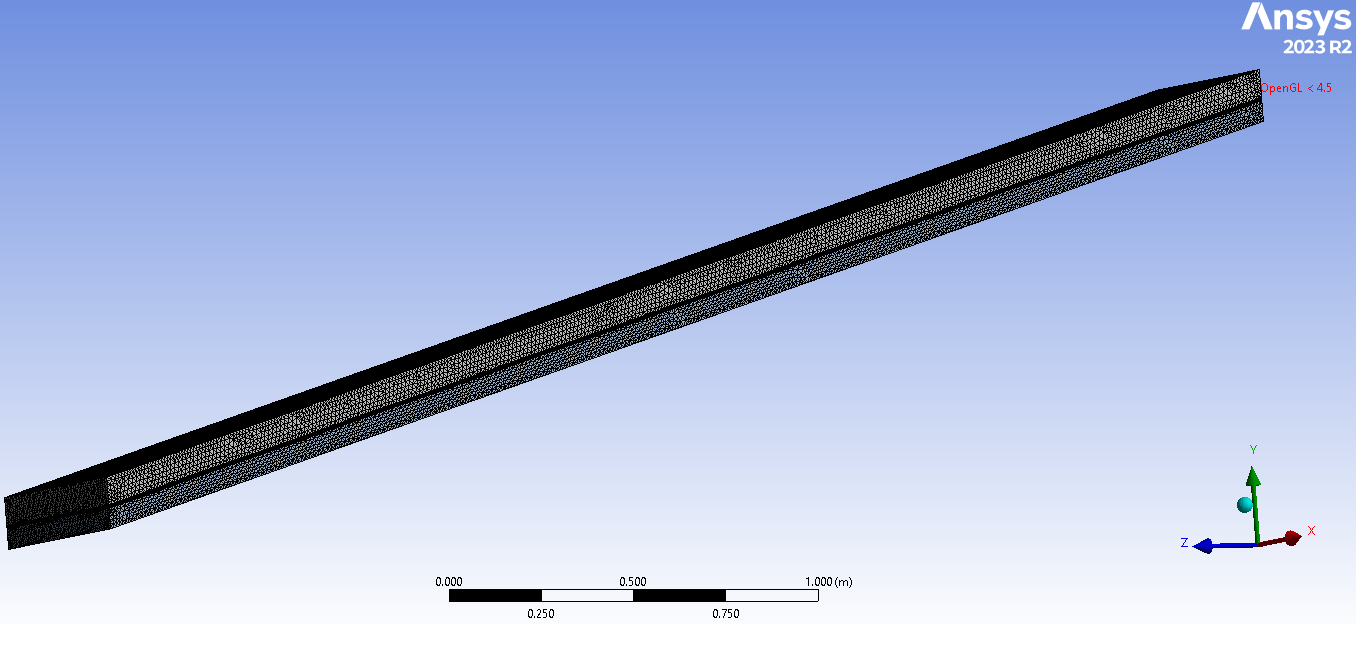TAGGED: fluent-mesh, heat-flux, heatflux, mesh-refinement, Mesh-sensitivity
-
-
September 4, 2024 at 9:35 am
nickolas.giacomitti
SubscriberHello!
I'm making a mesh sensitivity analisys for a solar air heater (utilizing solar calculator with a montecarlo model for radiation in fluent solver) and a phase change material for energy storage during "nigth". One of the parameters I was getting for comparison between mesh refinements was the 'phase change materials walls total heat flux' trougth the simulation, but for every mesh refinement the 'phase change materials walls total heat flux' gets lower and lower, to the point that i started with a 200 w/m² with a coarse mesh (Element Size of 50mm and a total of 3200 elemets) and with a refined mesh utilizing inflation in the heat transfer area for more accuracy I obteined a 4 w/m² utilizing all the same configuration for fluent solver only the mesh refinement changed (Element Size of 10mm, inflation and a total of 1027329 elemets).
Does someone know why this is happening?
I have looked up in ansys user guide "26.1. Fluxes Through Boundaries" but I could not find a answer for my question.
Attached a image of the refined mesh with inflation in the separation between the air canal (gray) and the PCM thermal energy storage (blue).
Thanks!!
-
September 5, 2024 at 7:38 am
V.P
Ansys EmployeeHi Nickolas,
It’s important to perform a proper mesh independence study. You need to verify that the results (heat flux, temperature distribution, etc.) are not still changing significantly as you refine the mesh. A drastic drop in heat flux suggests that you may not have reached mesh independence. Refine the mesh in smaller increments to see how the heat flux changes. You should observe a point where the changes in heat flux stabilize, which indicates mesh independence.
Another thing that you should be careful of is mesh quality. Check the skewness and orthogonality of your refined mesh. Ensure that the mesh quality remains high as you refine. You can use Fluent’s mesh quality check tools for this. Also, other thing is that if the solution isn't fully converged, you may see incorrect results. Check for convergence before arriving at any conclusion.
-
September 6, 2024 at 7:47 am
nickolas.giacomitti
SubscriberHello, CFD_Friend! Thanks for your answer!
I have made a series of mesh refinement starting in a coarse mesh and refining in small increments, but every other parameter (temperature distribution, velocity, mass and energy ballance, heat flux) are stable in every mesh refinement I have done, the only parameter that have changed significantly is the "walls total heat flux".
For the tests that I have done, improoving mesh quality (skewness and orthogonality) does not change the reduction in "walls total heat flux" across mesh refinements.
In the table below are the results for mesh quality trough the iterations of mesh refinement, note that the simulation with the worst mesh quality parameters (in green) resulted in more accurate results compared with the analytical aproatch and compared with the other mesh iterations. In the same table you can see that the finer the mesh, lower is the delta heat flux, witch is the "walls total heat flux". It is possible to verify that, for the first 4 mesh refinements, the skewness and ortogonality did not change but the "walls total heat flux" (Delta heat flux (w/m²)) have reduced significantly with other parameters like temperature distribution, heat flux, stream velocity, mass and energy ballance results are in par (with certan error) with the analytical approach.
As for my tests, lower delta heat flux is correlated with grater simulation precision and/or resolution but I canot prove it by any documentation, and in a certain way does not make sanse when we see that the unity is w/m², therefore this value should not change with the mesh refinement because the superficial area of the 3D body must be rougthly the same across mesh refinement.
Do you have any more thogths to this matter?
-
- You must be logged in to reply to this topic.



-
4914
-
1608
-
1386
-
1242
-
1021

© 2026 Copyright ANSYS, Inc. All rights reserved.









